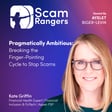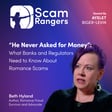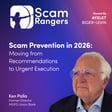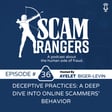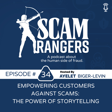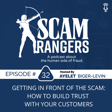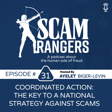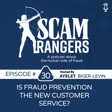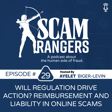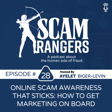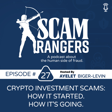Interest in Scams and Human Nature
00:00:00
Speaker
But it's like anything else, people really only become interested in the subject if and when it impacts them and not beforehand.
00:00:11
Speaker
So it's like people, the most people who buy burglar alarms are people who have just been burgled. OK, and people who get most interested in scams, unfortunately, are people people.
00:00:23
Speaker
probably have just been scammed or know of a relative who've been scammed. And I would love that to change. I would love people to be, in general, much more aware of scams than they currently are.
00:00:36
Speaker
And it's... It's human nature to think that scams affect everyone else. It would not happen to me. And unfortunately, you have to get to the point where you realise, and I am in this boat as well, scams can affect everyone or anyone, including me, including you.
00:00:58
Speaker
absolutely And if the circumstances are just right, and it might be by coincidence, it's not because you're being stupid or it's not because you haven't missed something which is dead obvious.
00:01:11
Speaker
It's because you're up against a professional who knows what to do, what to say. They've had experience. they They know. There's a reason why a lot of scams are scripted. It's because they work.
Introduction to Scam Rangers Podcast and Guests
00:01:25
Speaker
The Scam Rangers podcast is brought to you by Rangers AI. We've created an app that helps you empower your customers against online scams. If you would like to try it out, go to the App Store and download ScanRanger, one word.
00:01:40
Speaker
Then go to ScanRanger.ai and claim an activation code on the top right. We're giving it out for free for a limited time and number of users. Let us know what you think by emailing us at info at ScanRanger.ai.
00:02:00
Speaker
Scam Rangers, ah podcast about the human side of fraud and the people who are on a mission to protect us. I'm your host, Ayelet Bigger Levine, and I'm passionate about driving awareness and solving this problem.
00:02:18
Speaker
I'm very, very excited to introduce today's guest, today's Scam Ranger on the podcast, Jim Browning. Welcome to Scam Rangers. Hello Islet.
00:02:29
Speaker
Yeah, thanks for inviting me. And yeah, it's a pleasure to speak with you. And yeah, I kind of like what you're doing with Scam Rangers. So thanks for inviting me along. Thank you. And we'll talk about what you're doing with
Journey from Scam Contact to Impact
00:02:43
Speaker
scams. And I just wanted to mention for those who are not familiar with you, Jim has a YouTube channel called Tech Support Scams with 4.41 million followers globally. So congratulations.
00:02:58
Speaker
And the work that you are doing is so important. So I'm so in awe, actually, to have you here today, ah talking to us about scams, about why, and about what you're doing.
00:03:10
Speaker
I've been talking but about the scam lifecycle a lot on the podcast on Scam Rangers. Let's really look at the end-to-end journey that the victim, unfortunately, is going through from the initial contact to it could be an incoming call or text to step-by-step the social engineering, the emotional manipulation,
00:03:31
Speaker
then trying to perform transaction or provide details to the criminal. And then, you know, the money is stolen, then the recovery process starts, and then there can be a scam again in the recovery process. And I think you touch many of the these points, but...
00:03:47
Speaker
One of the things that I always say is it's it's best to you know disrupt the scam before it happens, because once the emotional manipulation starts, that's where the challenge comes in.
Jim Browning's Background and YouTube Channel
00:03:58
Speaker
So like to go back and ask you, first of all, maybe a little bit, tell us about your background, and then we'll talk about your YouTube channel and other activity and how you got into this.
00:04:09
Speaker
Sure. Yeah, I mean, um I've had the YouTube channel ah incredibly over 10 years at this point. And what I do is go a little bit deep into scams because everything that I do is always about trying to see how scams work. So what makes me tick is trying to go a little bit deeper than the average scam bader. So scam bading is this...
00:04:37
Speaker
activity where people try to keep scammers engaged for as long as possible. Obviously have a bit of fun, of course, when you're at that, because having fun would, if you didn't have fun, you'd kind of go insane because you kind of know what these people are up to.
00:04:52
Speaker
But with me, i drill a little bit deeper. What I'd like to do is find out who it is that's on the end of this phone call or this email or this SMS and find out exactly how their scam actually works.
00:05:08
Speaker
And chances are, if you haven't seen any of my videos before, maybe you'll have picked up on one or two, which shows maybe a scam call center on CCTV.
00:05:19
Speaker
And there might be somebody calling the scammers by their real names. If you've seen something like that. chances are that's a Jim Browning video. So yes, that's what I'm about.
00:05:30
Speaker
Like I say, got into this over 10 years ago and I've had my eyes opened and as to how these scams work. How did this start? i'm I'm sure that was not your original profession.
00:05:44
Speaker
And then one day you started researching or creating these videos or you came across something. How did it all start? Well, I would say accidentally. So, you know, I never intended to be a YouTuber. That's the first thing.
00:05:57
Speaker
um I i ah basically 10 years ago had until very recently, in fact, a normal job in IT. And my job had nothing to do with Internet security, nothing to with cybersecurity, nothing to do with anything really that you see on YouTube.
00:06:16
Speaker
But what I did, though, was I would quite often work at home, as a lot of people do, particularly during the pandemic. I guess a lot of people find themselves working at home more often probably than they normally would.
00:06:29
Speaker
And what I found was I was getting a lot of scam phone calls and. i'm one of these people who thinks to themselves maybe somebody could do something about it hey i'm technical i'm in it i know about computer networks maybe it's something that i could do about it and really that was what got me started it was actually just getting annoyed by all those scam phone calls knowing their scams knowing microsoft don't call you knowing amazon don't call you
00:07:00
Speaker
And I thought, maybe I could do a little bit more than just talk to these people who call you up. And that's really where it all started. I thought, I'll make clear recordings of the scams, see exactly what they're up to. I've been asked a few times from other people who'd received similar calls, look, what is it that these guys are actually trying to do?
00:07:21
Speaker
And the short answer is, get money from you, but how do they do that? And I thought I will try and find out exactly how to do this. And that's really where it all started. And when I uploaded the videos, it wasn't to create a YouTube channel. It was purely that I could have a video somewhere on the Internet that I could send to these guys ISP to try and get them thrown off their network.
00:07:46
Speaker
Or so I thought naively. But in fact, all that happened was exactly nothing. And in fact, that my videos started to get popular just because I had made clear recordings.
00:07:59
Speaker
And I found that what was really interesting was if you dig a little bit deeper into the scams and maybe expose a little bit more than just talking or corresponding with the scammer, then those can be quite interesting to a lot of people.
Jim's Techniques in Exposing Scams
00:08:15
Speaker
But the ones that really took off where was where i reversed the scan. And instead of the scammer getting access to my computer, what I was really doing was plotting to try and get access to their computer.
00:08:29
Speaker
And of course, when you can do that, you open up a whole world of what the scammers end of this looks like. So when I could see their computers, Then I can see their webcams, their CCTV. I can hear their other phone calls and that opens up a whole new world. So that's what I think makes my YouTube channel a little bit more interesting is that I can see a little bit beyond just one scam.
00:08:58
Speaker
Yeah, and that's that's really, yeah I think, that that aha moment of, wait, I can get in, and now I can learn about them, and now maybe we can drive some action. So the first thing was kind of revealing them, freaking them out. And i don't know, do you feel like the fact that you were able to see them and call them out, did that freak them out enough for them to stop? Or...
00:09:19
Speaker
um what what are your thoughts around that and i know there was also a lot of action that was taken we'll get to that in terms of collaboration with law enforcement and things like that but um what was the first time maybe where you you created a video where you got into ah scam call center you were able to know them by their names know about their and and spook them essentially freak them out what were some of the reactions from their perspective yeah so i mean I've got to say, out of the 10 years that I've been doing this, I've only really in the last four or five years really got into reversing that connection. So the very first time was about five years ago, whenever there's a ah remote access a tool called TeamViewer.
00:10:06
Speaker
And at one point, TeamViewer basically clamped down or trying to clamp down on scammers. And at one point, they actually banned the entire country of India from using their product because it was being abused so much.
00:10:23
Speaker
And at that stage, the scammers didn't want to give up. And they they were using TeamViewer as one of their main kind of ways of getting to a victim's computer.
00:10:34
Speaker
So they didn't want to give that up. So instead, what they did was the the scammers kind of used a feature of TeamViewer where you can kind of switch sides with partner so they couldn't initiate the connection.
00:10:50
Speaker
So that meant that what I would have to do and the scammer was telling me, look, I need you to connect to this ID and use this password. And that's normally what they get the victims to do.
00:11:03
Speaker
So whenever I heard that, I was quite surprised, didn't understand why they were doing this. But what it gave me was an opportunity to connect to the scammer's computer, but not do the second step.
00:11:15
Speaker
that he wanted me to do, which was to switch sides again. So he was basically giving me ah username and a password that allowed me direct access to his computer in the hope that I would do the second step. of course, i didn't do the second step.
00:11:30
Speaker
And as soon as I get access to the scammer's computer, he told me his username and password effectively. Then I locked his computer. I locked his keyboard and mouse.
00:11:41
Speaker
And I was then I had full control over his computer. And he didn't know what to do at this stage because obviously he was expecting someone just to comply with all of his instructions.
00:11:54
Speaker
But that was the very first time that I actually managed to get access to a scammer's computer. And I was able to immediately download all his files. And then I deleted anything that he had on his computer.
00:12:07
Speaker
So I really kind of wrecked his entire scam. And at the same time, I'd taken a lot of his information and I could see like other victims, other people he had scammed before.
00:12:19
Speaker
And it gave me a good idea what he was up to. In fact, there was some personal information on there and I was able to find out who that scammer actually was. And I thought, look, if I can do something like that,
00:12:32
Speaker
then it makes the whole thing so much more interesting. And that's really what kind of started me into maybe i can go a little bit deeper. Maybe there's other ways of doing this, because, of course, as soon as that activity, the the ability to not switch sides with the partner, as soon as that was revealed,
00:12:53
Speaker
then of course the scammers react to that so it is kind of cat and mouse so i have new techniques these days where i don't need to rely on something like that i have a different technique i'm sure you're not revealing what you're doing i can't unfortunately would love to because that's almost as interesting as kind of talking about scams themselves is how you get back to scammers but i can't reveal too much unfortunately Of course, of course.
00:13:20
Speaker
So what are what were if we go to kind of the emotional reaction from their perspective? What are some, you know, what are some outcomes of that reverse action where you take over their computer, you let them know that you call them on the videos, you show where you call them and you ask and you know exactly who's sitting where and what their names are and what their fake names are.
00:13:42
Speaker
What are some reactions that criminals but have when when they realize, does it does it really disrupt? Does it stop them or does it just? I would love to think that it does. i mean, in some cases, it definitely has because I've basically exposed some entire, I mean, as you can imagine, if you can see even just one computer on this network, if it's a valuable computer like a supervisor, for example,
00:14:11
Speaker
You can basically find out exactly who it is they've scammed, how much money they've taken, who the kind of people who run the organization are. You can really unravel their entire operation in theory.
00:14:25
Speaker
And that has been done. I have done this personally a few times. And the reactions generally are... Initially, they don't believe that they've been exposed. This is this kind of nearly a
Reactions to Scam Exposure
00:14:38
Speaker
life cycle of this.
00:14:39
Speaker
So that first when you challenge them and say, hey, I know you're in India, I know where you are and so on, they will kind of laugh at you because I'm sure they hear that from a lot of people.
00:14:50
Speaker
But what I tend to do is drip feed them information that I have gleaned over the last number of days or weeks or months sometimes. and I will potentially use their real names. I have done this quite a number of times.
00:15:05
Speaker
And of course, no scammer ever, in my experience, ever uses their real name. So when you start to introduce real names, then they are taken aback. Then you start to get them pausing. And then they're not quite as bravado as they would have been normally whenever they kind of...
00:15:26
Speaker
think that you're one of these people that they speak to all the time and says, I'm going to, you know, they'll hear an Indian accent and say, hey, I know you're in India. But when you when you're able to precisely tell them where they are, which street they're in, what their boss's name is, what their own real name is,
00:15:44
Speaker
then they start to take you a little bit more seriously. Now, unfortunately, a lot of them immediately hang up and kind of pull the wired connections out of their computers, of course.
00:15:56
Speaker
author Others, though, want to know high on earth I've managed to find out all of these this information. And that has happened quite a few times. So there was one example where I collaborated with guy called Mark Rober. If you're into YouTube at all, he's one of these guys who's very well known. And I collaborated with him at one point and I managed to get CCTV of the call center.
00:16:25
Speaker
And I had spent a little bit of time calling around each of the individual phones because you can do that if you're if you know their system well enough.
00:16:36
Speaker
And I was able to establish who was sitting where on the CCTV, what their real name was, what their fake name was, what their extension was. And I was able to call up those individuals and call them by their real name. And I could see the reaction on the webcams.
00:16:55
Speaker
And that was fascinating because you very rarely get to see that. But there was one poor girl called... Priya, and I called her out by her real name and she could not work out how on earth I was able to do this.
00:17:09
Speaker
And she kept asking over and over, how do you know my real name? And I just basically lied to her because obviously I picked it up from their calling system. Didn't want to tell her that, of course.
00:17:20
Speaker
And let her stew in that. and And she couldn't. I told her, I think at one point that she had told me her real name. She hadn't of course. and But I just wanted to see her reaction.
00:17:34
Speaker
And then when I told her this, then she said, well, can you work out anybody else's name? Of course, I knew everyone's name in advance. And she said, like, who's sitting on my right side?
00:17:45
Speaker
And I knew that that was whoever it was. I was able to call out that name and who's my left side? And that was Mimi or whatever. And honestly, it just to see the look on her face when she was trying to figure out how all of this worked, but that that to me was is definitely one of the highlights because, you know, scams are serious businesses, but...
00:18:07
Speaker
If you can get one over on scammers, if you can let them kind of think that something something could happen were their real names and real kind of victims that that they get from these.
00:18:22
Speaker
If all of that could be unraveled, then I think they you know that they don't know what to expect. And it's nice just getting one over on scammers like that. Yeah, and I think it's it's hopefully a detractor as well, right? Because they're always going to be looking over their shoulder and they're always going to be afraid that someone that could connect to maybe law enforcement could, it's you know, they feel safe in the place that they're sitting, but be it India or Pakistan, or unfortunately it's global
Major Exposures and Consequences
00:18:51
Speaker
at this point. yeah
00:18:52
Speaker
But you actually had a success story in one of the videos. You talk about a scam center in Dubai that was actually... taken down by the government um i hope it's i think it's dubai right it is yeah share maybe that that story with us Yeah, um so the the background to that one is that I was approached by somebody who was working in a scam call center in Dubai and they were running what's called a pig butchering scam.
00:19:21
Speaker
Pig butchering is just, it's another name. a lot of people don't like that name, but it is basically a romance scam combined with a crypto investment scam.
00:19:32
Speaker
And it's typically run by Chinese gangs. So you actually have Chinese mafia sometimes involved in that sort of scam. But the long and short of it was there was one person who was working there and he did not like the fact that this was part of him. He's running a scam when he initially applied for the job. He thought it was legitimate.
00:19:54
Speaker
But within one day, he realized that he was pretending to be a glamorous lady, even though he was a man. And he was his job really was to correspond with people in foreign countries, to build a relationship with them and eventually encourage them to make as much money as apparently she was making.
00:20:18
Speaker
And the way to do this was to invest in this crypto. ah The crypto platform was completely fake. If anyone actually invested money in it, they would just lose that. But the website was deliberately constructed so that it would make it look as if anyone who put money into it would make money, would make a profit.
00:20:39
Speaker
And that's a very sickening scam. And a lot of people, unfortunately, have fallen victim to that scam. But the guy who was involved in that reached out to me by email and said, I'm in this call center.
00:20:53
Speaker
Would you like to find out a bit more information about it? And of course, I... love people to reach out to me who are in that sort of position because it helps me expose who the kind of key players are in that sort of scam.
00:21:09
Speaker
So to cut a very long story short, I was able to look at what was going on on the PCs where this guy was working and was able to confirm, yes, indeed, it was a scam.
00:21:23
Speaker
And because of the insider footage that this guy got, I was able to make a very compelling video about exactly how this scam worked. Now, before I released that video, I did approach the police in Dubai to say, this is going on on your doorstep. Can you do something about it?
00:21:42
Speaker
I got other agencies involved here used to liaising with local police, but the long and short of that was nothing actually happened. And although we were promised that something might happen,
00:21:55
Speaker
It took months and months and eventually the police just, it after any approach that we made, they just went very quiet. So at that point, I decided to release the video and that must have embarrassed some people at the top of the organisation. I'm not sure who exactly it embarrassed, but within about six or seven weeks. Of the police, right? Of the police, yes. But may be in Dubai there may be higher authorities again than the police who may have been embarrassed by all of this. I just don't know.
00:22:30
Speaker
But the long and short of it is six or seven weeks later, after the video was released, then and only then did the police actually read that location. And even though it had been published and the locations and some of the insider footage was published, they still kept going. They were still confident enough that nothing would happen.
00:22:52
Speaker
that they, even though all of this had been exposed, they kept going, the police raided it, and they actually managed to arrest over 3,000 people. 3,000 people were involved in that scam.
00:23:04
Speaker
2,000 in just one location. It it is insane absolutely mad. But you can imagine you would need that sort of scale of operation to effectively run that sort of scam against multiple countries throughout the world. And it was a truly global scam.
00:23:23
Speaker
But that's what happened. They they arrested about 3000 people. Most of them were migrant workers in Dubai. Most were from kind of North Africa or Asia. um Were there trafficked, some of them or?
00:23:35
Speaker
no work Not in this case, although a lot of the pigleturing operations, they do have trafficked people. That tends to happen more in Myanmar and maybe Cambodia. It wasn't the case in Dubai, but nevertheless, the you know the people who work there were were kind of.
00:23:52
Speaker
They didn't really have a choice in it when they were there. They were kept in this accommodation and their passports were even held by the operatives. So a law wasn't. as So they were under false pretense, right? Because ah you talked about the job description and the person who contacted you at least was manipulated into doing that. So it's not very dissimilar to some of the stories from Myanmar and how people are lured into fake jobs and then passports taken and then they're essentially forced. Oh yeah, I mean, it's it's exactly the same sort of setup. it's probably the same gangs who are involved in the Dubai operation as the ones in Southeast Asia.
00:24:34
Speaker
um But yes, the Dubai one in this case people were a little bit freer to move around than they would have been in other countries. They were not, in this case, they weren't trafficked, but at the same time, they were definitely manipulated.
00:24:50
Speaker
That's amazing that actually, you know, you you start as a curious engineer and then ah create YouTube videos that already go viral, but then you have true impact in actually disrupting scams. So congratulations and and and and thank you for for this.
00:25:07
Speaker
i mean, i would i would love to have more impact. And even if it's only just to highlight what a scam looks like, oh That's exactly what I wanted to transition into, actually. Right. OK.
00:25:19
Speaker
So let's talk about that a little bit. um I saw one of the videos ah ah kind of that that you that you recently ah fairly recently released talks about the anatomy of a scam.
00:25:32
Speaker
um I think it starts, it's a very complicated scam And I can tell you from the consumer side, um my mom's friend actually went through this.
00:25:43
Speaker
The whole, you have a discount on your, we're going to give you a discount because you're such a loyal customer to this this or that telco company. And there's this whole back and forth of actually giving a phone, but it's not exactly the phone that the the the victim had ordered and and mule accounts, taking the phones and all that.
00:26:02
Speaker
So walk me a little bit through the the ability to actually understand the anatomy of a scam through your work and maybe give a few examples like the one I gave, but more in depth. Sure.
Scammer Tactics and Identity Theft
00:26:16
Speaker
Yeah. mean, the one you're talking about there, I tend to find operates in Pakistan rather than India. And I'm not quite sure why that is. i ah suspect more that it's probably something to do with expertise and that sort of scam. And then it gets passed around, i think anyway. But i've I've come across at least 10 or 11 different groups in Pakistan who run the same sort of scam.
00:26:45
Speaker
And the scam goes something like this. You will get a phone call from your mobile phone, your cell phone operator. offering you 30, 40, 50% discount, whatever it is, it's it's a large discount.
00:26:59
Speaker
It may not be a cell phone operator, operatorter it could be your broadband provider, it could be your utility provider, it could be an electricity company, whatever. It's someone calls you out of the blue and offers you a discount.
00:27:13
Speaker
And of course, that sort of thing happens. That is you know, that may happen when certain companies do a promotion. So it isn't initially unbelievable. and that's the kind of key to this.
00:27:28
Speaker
But what they do is they will say that... Before you dive into that, the data that they have about a user belonging to a certain company, is that from data breaches? is that How do they get the initial connection between me and my cell phone provider? me and how do How do they make that contact?
00:27:48
Speaker
I've got to say, from all of the calls that I listen to, It's very much a fishing expedition, so they will rarely have accurate information. OK, but they what they will do is they will just use um very large numbers of phone calls.
00:28:06
Speaker
And the chances are that if they call someone and they say, hey, this is Spectrum, we're going to give you 40% discount. they have maybe a one in three chance of you being with Spectrum.
00:28:18
Speaker
So rarely do I ever find them with very accurate information like that. So it's purely a numbers game. But if you make enough phone calls and you're pretending to be a certain cell phone company or you're pretending to be whoever it is, eventually you're going to make a hit there.
00:28:36
Speaker
And of course, if you are with that company, then you're more likely to be receptive to that phone call and the scammers know this. But if you listen to the calls, honestly, you will find that the majority of people say, hey, I'm not with whatever the company name is.
00:28:53
Speaker
so Where does the data come from? Honestly, it could come from anywhere. And what you tend to find is that the same old data gets passed around multiple scam call centers again and again and again.
00:29:07
Speaker
So if you get one phone call, chances are you're going to get 100 different phone calls from people pretending to be various companies. So sadly, I never find out there isn't like a huge single data source for this.
00:29:21
Speaker
Yes, of course, it could be data breaches. Yes. But in reality, what I find is, no, they will just get past a spreadsheet from one of their colleagues and they'll just plow away at the numbers there. It's very rarely targeted.
00:29:38
Speaker
So do you want me to elaborate a bit more on what that scam actually does? and Yeah, yeah, definitely. So initially it starts off with, we're going to offer you a discount.
00:29:49
Speaker
We're going to give you 40, 50, 60% discount. um All you need to do is cancel your initial billing. So of course they will want your new billing information, even though in theory, if it's your existing company, you should already know this.
00:30:07
Speaker
But they persuade people that in order to avail of this discount, you've got to give new details. So you've got to give your, you know, debit card, credit card, whatever it is, as well as banking information. So you will take everything they can get from you.
00:30:25
Speaker
And with that, they can do one of two things. One is they can actually, and most of them, try to go into your actual account by basically saying that in order to verify who I'm speaking with, I'm going to send you a one-time code.
00:30:43
Speaker
And what they're actually doing there is resetting your password so that they've asked you for what's your email address. And then they'll say, right, I'm going to send you a one-time code. And if you read out that code, what they're actually doing is resetting your password and they're logging into your Xfinity or your electricity account, whatever it is, and then they can see more of your information. So as soon as you read out that one-time code, they basically can see all of your personal information. They've reset your password, they've logged in with the re the reset password, they now know the password.
00:31:20
Speaker
and they can see all your personal information they will say hello mr smith i can see your last bill was a hundred dollars and we're going to make it fifty dollars next month and in order to do that they will need your credit card and your banking information And then depending on the sort of scam they want to run, a lot of them, if they're cell phone companies, so if there may be in the US, you have typically, you know, Spectrum, AT&T, whoever it is.
00:31:53
Speaker
they will typically at that point go into your account and order a very expensive phone they will offer you something like i you know ear pods or something like that as a gesture and they say to pay for this to pay for the shipping they need your credit card information and then all of a sudden instead of ear pods you end up getting a very expensive phone delivered to your home address And of course, they'll have sent you an email saying, hey, if there's any problems, call us on this number, which isn't your official Xfinity or Spectrum or whatever number.
00:32:31
Speaker
And of course, they will wait for that phone call. Someone will call them up and say, why have I got this iPhone 15 instead of EarPods? And they'll say, I'm very sorry, sir, madam.
00:32:42
Speaker
That was a mistake. That was meant for another customer. Can you send it back to our depot? We'll send a courier to go and pick that up. So they've just ordered a very expensive phone using your account details and you have paid for it.
00:32:56
Speaker
And now you're going to be shipping it to someone who's ah basically a phone mule in that country. So that's how their scam works. They will get very expensive phones from you by purely offering you this discount and you reading out that one time code. That one time code is the key to it.
00:33:17
Speaker
So i I have to ask, first of all, that's very sophisticated. um Unfortunately, i know a few people who have went through this whole thing and shipped the phone. um In one case, it was the courier mule account didn't or mule person didn't pick up the phone. So they caught it in time and worked with the mobile carrier to rectify everything. But why, if they're taking so many details and so much information, why are they going through this whole courier a physical phone thing. Why aren't they just stealing the credit card and, you know, using it for financial transactions online?
00:33:53
Speaker
Why bother with this operation? i think the key to that scam is timing more than anything. So, yes, you would think that just having the credit card information would be enough, but it's not. What you tend to find is if they try to use that credit card information to purchase something that will generate in usually will generate a one-time code to the actual owner of that card.
00:34:21
Speaker
So whatever they do, they have to make sure the victim is he able to read out those codes so that they can complete that transaction. And if they can do this by basically using the victim's own account to make that purchase then they bypass that one-time code so the fact that they've got control of their account gives them that access now i have seen other scammers pretending to be banks for example and they will
00:34:55
Speaker
on their computer screen they will have the full victim's name, address, credit card number including you know the CVV and everything in front of them but they can't use that and the key is that when they make the call to the victim pretending to be their bank they will use some excuse so for the victim to read out the one-time code that they will generate as they try to use that card and purchase something.
00:35:25
Speaker
So the usual bank scam goes along the lines of, hello, I'm with NatWest or I'm with Bank of America. I see some suspicious transactions on your account.
00:35:36
Speaker
I'm just going to run through a few details. And don't forget, they already the scammer already knows what your credit card number is. That's that's fine. But the key to the scam is they will order something, usually a gift card.
00:35:51
Speaker
They will purchase this online and they will tee the victim up to say in order to cancel this transaction that this scam thief is trying to use your card at the moment and in order to cancel this the what you've got to do is read out this one-time code so that is the key to their scam so the long short of it's if anyone ever asks you to read out a one-time code yeah immediately you that should be ringing alarm bells because no one other than you yourself should ever need to see one-time passcode and if you read it out that is the exact equivalent of calling out your password and i think if people got that into their heads that reading out one-time codes is the same as reading out your own password to someone
00:36:44
Speaker
If that was embedded in people's
Complex Scam Strategies
00:36:46
Speaker
brains, then I think this is less likely to happen. Yeah, absolutely. um I have ah a kind of a story about that one in a second, but ah just to summarize what we just heard. So it it can start with this service provider like a telco or other service provider.
00:37:07
Speaker
getting all the financial information from the victim by asking all these questions to upgrade. So promising them a benefit or something like that. And then once they have all the information and the bank details and everything, they can actually use that for a different scam, the payment alert scam. So like sending a text message and saying, you know, call us back if you didn't if you didn't do this and then asking for the one-time passcode to cancel, quote unquote, that fake payment. So it's kind of a multi-scam faceted approach here where they can use one and then another and then another. And and you mentioned earlier that they pass information from between call centers to perform different activities.
00:37:49
Speaker
Yeah, and the reason why I know that is i have lots, I use, I never use my real name, okay, but what I do is i have a lot of fake identities that I'll read out to scammers.
00:38:00
Speaker
And if i engage when I do, and maybe I get a phone call out of the blue and I'll use like the name of Orson Cart, that's one of my many aliases.
00:38:11
Speaker
And a few months later, I will get a different phone call, a different sort of scam. And the person on the end of the phone will call up and say, hello, is that Orson? And I, of course, will have answered yes. But because I have so many of these ones, when I hear the name, it is typically...
00:38:30
Speaker
a few weeks or months after that initial call so scammers absolutely sell data to other scammers and that's kind of key to all of this scammers don't really care ultimately where that data is coming from they will play the numbers game and all they will want to do is try to get as many phone numbers as many personal details as they possibly can to keep going with their scams I actually had one legitimate experience with a service provider where they asked me for my code and I was so mad. Yeah. Exactly because of what you said. It was legitimate. I know, i know what you know, and I said, I'm not giving you my code. I can't believe that you're asking me for my code. It's not good protocol. You need to change your protocol. then
00:39:18
Speaker
i what i did i i totally totally agree um i i've had i mentioned this on other videos and i had people actually comment below and said actually we do this occasion we will ask a person for this code and i i'm exactly the same i mean it completely goes against what everybody should be educated in.
00:39:42
Speaker
And, you know, if that is your process, if if your company actually uses this as a way to, I don't know the you know, tell whether this is the account or whatever it is, change it. You know, there must be some other way of doing this. But if people need to have simple information, you know, not, oh, occasionally this company will send you this code it's okay to read it. No, that's just wrong.
00:40:06
Speaker
Just never read out one-time codes ever, full stop. Yeah, that's a very bad practice. So i wanted to ask you, what is maybe your favorite video that you made that you're kind of most proud of besides the ones that we already mentioned but or what was an aha moment for you well i mean i i probably have two that i would mention one is a very short one that i created years and years ago maybe seven eight nine years ago and it's very simply that i had something called a sound board and a sound board simply
00:40:41
Speaker
has a bit of audio and I had Arnold Schwarzenegger's quotes on this soundboard and he they're from all all of his movies.
Memorable Moments in Scam Exposing
00:40:51
Speaker
And I thought, I wonder how long it could be that I could have a conversation with this with a scammer using only Arnold Schwarzenegger's voice or little phrases.
00:41:01
Speaker
And I kept the call going for about 20 minutes. And that to me it was one of my most proud moments, I've got to say, because they there was enough quotes there to kind of keep the scam going for as long as possible.
00:41:13
Speaker
So I did like that one. um But, you know, that was kind of audio only. The other one that I would say, which is kind of with video, is probably the one, the very first one.
00:41:26
Speaker
where I was able to get Scammer CCTV and it was a company called Fairmart Travels. And if that sounds like a travel agency, that's exactly what their kind of front end was. That was their kind of fake company.
00:41:42
Speaker
and where they were really making the money was pretending to be microsoft and they were running pop-up scams so pop-ups are these kind of fake virus alerts which might if you hit the wrong web page go full screen have a loud message saying your computer's got a virus call this number and it's all fake and this company fairmart travels were having those calls diverted to their call center and they were making hundreds, thousands of dollars every month with this scam.
00:42:17
Speaker
And they were the first company that I managed to see on CCTV. So that kind of, for me, that's kind of a almost a watershed moment because it showed these scammers lying to me face to face.
00:42:32
Speaker
So I would actually call one of them up because the phone number was on the pop up and I would be able to figure out who I was speaking to because I would let them onto my computer.
00:42:43
Speaker
If the room was crowded, i would change my desktop background to some like bright purple or bright green. And then I could look around the call center to see who's got the purple or green screen.
00:42:56
Speaker
So I knew who I was speaking to, focus in on that guy. And I was then able to have a conversation with them virtually face to face. And I would just listen to them lying to me.
00:43:08
Speaker
You know, I would ask them, well, hey, where are you? Knowing they were in Delhi. and they would say hey i'm in san jose and that was just so satisfying to watch because was saying well i don't think you are in san jose what name me a restaurant in san jose and i could see him pull up the google screen to try and get ah like a local restaurant name and i said to him i hope you're not googling And I could just see him do all of this. So for me, that was the one that kind of really thought, right, if I can do a bit more of this, then I'm sure people would be interested in it. So that for me is the other one that I would really like to kind of highlight that that I'm most proud of that one.
00:43:51
Speaker
That's amazing. That's kind of a, oh, what can what can we do with this capability moment? um So, first of all, again, thank you for everything and thank you for what you're doing. And and every mi moment spent with you is not spent with um with us, right, with the with the potential victims of of these scams.
00:44:11
Speaker
what What is the future holding? what what What's next for you? What are are you kind of your aspirations maybe? And what could our listeners who are mostly kind of fraud fighters in the community, what what what are your thoughts on what people can do in this context of your work and how can they help you?
Importance of Network Against Scams
00:44:33
Speaker
Well, mean, you have to fight a network and believe it or not, the scammers are a network. You know, you can't just rely on one or two people to steal money from others. You have to have a network to,
00:44:49
Speaker
to get money past some various obstacles, particularly from the banks, you know whether it's wire transfers, whatever is gift cards, you you need a network of people.
00:45:00
Speaker
And for me to fight scams like this, you also need a network. And that's why I'm particularly keen on speaking with other people who are involved in fighting scams. So obviously Scam Rangers is one of those. I think your product is a very good one.
00:45:20
Speaker
um I've been using it for a little while now and I think i think it's excellent. um Definitely gives good advice. But it's like anything else, people really only become interested in the subject if and when it impacts them and not beforehand.
00:45:40
Speaker
So it's like people, the most people who buy burglar alarms are people who have just been burgled. OK, and people who get most interested in scams, unfortunately, are people probably.
00:45:52
Speaker
probably have just been scammed or know of a relative who've been scammed. And I would love that to change. I would love people to be, in general, much more aware of scams than they currently are.
00:46:06
Speaker
And it's... It's human nature to think that scams affect everyone else. It would not happen to me. And unfortunately, you have to get to the point where you realise, and I am in this boat as well, scams can affect everyone or anyone, including me, including you.
00:46:28
Speaker
absolutely And if the circumstances are just right and it might be by coincidence, it's not because you're being stupid or it's not because you haven't missed something which is dead obvious.
00:46:40
Speaker
It's because you're up against a professional who knows what to do, to what to say. They've had experience. they They know there's a reason why a lot of scams are scripted. It's because they properly.
00:46:54
Speaker
and And just because you know about the scam doesn't mean your neighbor knows about the scam. So the long and short of it is what I would like to do going forward is to spread awareness. Now, even if that only means that you watch my YouTube channel, which is easy to do and hopefully it's slightly entertaining.
00:47:13
Speaker
And even if it's me kind of calling a scammer by their real name. OK, it's a bit of a laugh, but at the end of the day, it's a serious subject.
00:47:24
Speaker
And if that has an impact on you that, hey, I've listened to what this person actually says, what the scammer sounds like. And if that is a small impact on you, if it rings in your head whenever maybe something similar happens to you, then I'll have done my job because the whole reason for that YouTube channel is just to raise awareness.
00:47:50
Speaker
Now, Not everybody sees my YouTube channel, so I do work with other media organizations, work with the BBC, working with other AARP in the United States, for example, just to try to get that awareness out there. So long term and where this is going is i want to kind of reach out to other media and to try and spread the word just that little bit further.
00:48:17
Speaker
Okay, so I'll definitely think about how I can help and I encourage all the listeners to think how we can help, think about how we can spread this. And I'll definitely put a link in the show notes to YouTube channel and specific videos that we talked about during this episode.
00:48:35
Speaker
So Jim Browning, not your real name. Thank you so much for being a guest, for taking the time and for sharing all these insights with us. Thank you, Islet. Anytime. Hope you continue with your quest as well. And hope Scam Rangers is successful. Thank you.
00:48:53
Speaker
Thank you so much.
00:48:57
Speaker
The ScanRangers podcast is brought to you by Rangers AI. We've created an app that helps you empower your customers against online scams. If you would like to try it out, go to the App Store and download ScanRanger, one word.
00:49:12
Speaker
Then go to ScanRanger.ai and claim an activation code.

